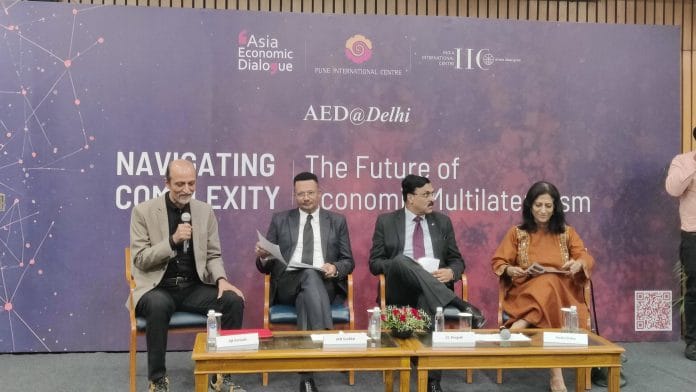New Delhi: At a time when India has been struggling with the impact of steep US tariffs, a group of panellists recently came together in Delhi to dissect the ramifications of this exclusion from global trade. India’s exit from the RCEP negotiations also came up in the Asia Economic Dialogue.
“You can always join the Regional Comprehensive Economic Partnership (RCEP) later, but then you have to accept the rules which have already been framed,” Ajit Ranade, an Indian economist and political science analyst, said, reminding the audience of India’s dramatic exit from the agreement in November 2019.
“The impact is already visible in India’s export sectors—shrimp, textiles, leather and footwear—all are feeling the squeeze,” he said, adding that it had taken almost a decade to negotiate the pact, which represents nearly 40% of global GDP. “Joining later means accepting existing rules without having had a say in shaping them. The advantage of joining early is being part of the rulemaking process,” said Ranade.
He pointed out the real cost of exclusion. “New supply chains do not respect borders easily. Investors prefer areas where economic integration is seamless. Being outside these zones means falling behind in decisions that shape investment flows,” he added.
Global trade under the lens
On 19 September, a distinguished panel came together to examine the rapidly evolving global trade landscape. The Pune International Centre (PIC) organised the event—an inter-sessional seminar at the India International Centre (IIC). Several influential voices from Asia, Africa, and Europe discussed the surge in tariffs, rising protectionism, and the future of economic multilateralism.
The seminar opened with remarks from the former Ambassador of India to China Gautam Bambawale, Convenor of Asia Economic Dialogue (AED), followed by a welcome from Ambassador Shyam Saran, President of IIC, and a keynote address by Foreign Secretary Ambassador Vikram Misri.
The panel, titled ‘Trump’s Tariffs – Whither Global Trade?’ was moderated by Ranade, a senior fellow at PIC, and featured professor Anil Sooklal, High Commissioner of South Africa; Ambassador JS Deepak (retd), Group Director for International Strategy and Public Policy; and Amita Batra, Professor at Jawaharlal Nehru University.
The discussion underscored the urgency and complexity of the current trade environment. Trade wars, tariffs, and shifting alliances impact not just economies but also the lives of farmers, factory workers, and everyday citizens. India now faces a critical choice—isolate itself, take a defensive stance, or engage strategically to shape global trade rules rather than merely respond to them.
“One Goldman Sachs report says that 80 per cent of the impact of the tariffs is going to be on the importer, which is US companies, and subsequently US consumers, which means that actually the burden is substantially much more on the importing country,” said Ranade. “Even though Mr Trump and his team believe that they will make up in terms of extra import duty revenues, which will then be given as tax breaks. But that’s a very long shot.”
Ranade estimated that GDP growth might decline by about 0.5 per cent if tensions persist. Moreover, an Indian delegation is working behind the scenes to persuade Washington to roll back certain penalty tariffs by late November.
Also read: Is India recalibrating Russian oil import strategy? Saudi Arabia discount offer is key
India’s plight
Sooklal then drew wider lines around this struggle. “We are witnessing seismic shifts in global trade that present both turnings and opportunities in the remodelling of the global economy,” he said.
He added that protectionism and unilateral tariff actions are undermining the rules‑based order—a system which, historically, has been essential for less powerful countries.
“What has been the pattern up to date? It has been that we are exporting raw material and then importing manufactured material, that is changing, and that is positive,” he said.
Deepak then shifted the lens to policy and strategy—particularly for India. He underlined three critical points: The effect of US‑led tariffs on Indian manufacturing and export capacity, the narratives justifying those tariffs, and India’s strategic options—whether to resist, accommodate or engage.
“In normal times, international trade grows by about 1 to 2 per cent. This year, it’s likely to be less than 1 per cent,” he said, adding that the slower pace will hit jobs, wealth creation and growth hard.
Deepak criticised the lack of counter‑narratives from India, especially the press and think tanks. He said governments elsewhere have challenged US arguments, but India has largely stayed quiet.
Batra talked about how India must respond. She argued that under the current uncertainty, it is vital that India resist turning inwards.
“What is absolutely certain is the uncertainty that is going to be at the bottom of global trade in the next few years. We have to move forward understanding that it is going to be a world that is going to be highly uncertain in terms of trade policy,” she said.
And yet, she held a thread of optimism: global trade continues to grow, investments are shifting, and rules‑based trade remains a tool, if India chooses to use it well.
(Edited by Saptak Datta)






